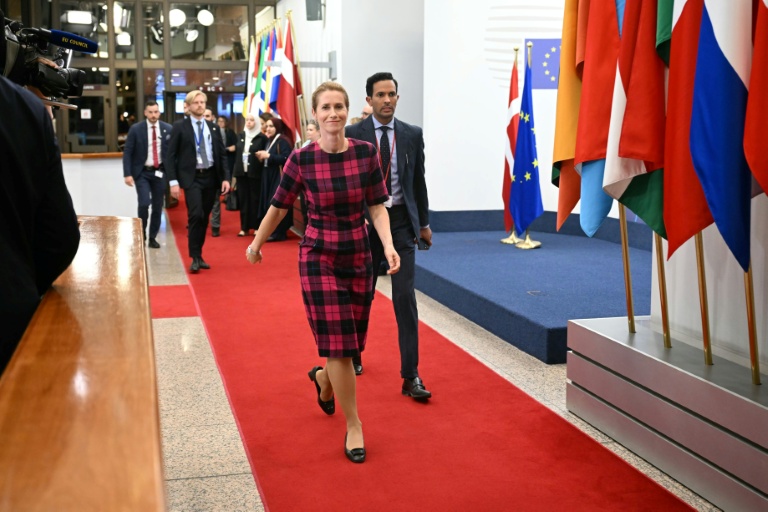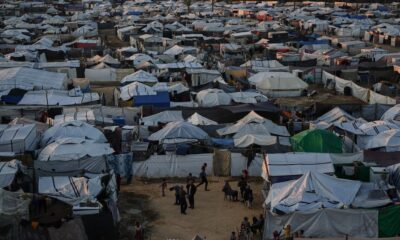World
EU Foreign Ministers Consider Steps Against Israel Over Gaza Conflict

EU foreign ministers convened on Tuesday to evaluate a range of potential actions against Israel in response to its ongoing military operations in Gaza. The discussions arise amid significant humanitarian concerns as the region faces severe conditions following Israel’s renewed offensive against Hamas. Despite the urgency, member states seem unlikely to reach a consensus on any definitive measures.
The bloc’s foreign policy chief, Kaja Kallas, has presented ten possible steps for consideration after Israel was found to violate a cooperation agreement with the EU on human rights grounds. Options include suspending the entire accord, reducing trade ties, sanctioning Israeli ministers, implementing an arms embargo, and halting visa-free travel for Israeli officials.
Despite the growing frustration over the humanitarian crisis in Gaza, EU member states remain deeply divided on how to respond. Kallas acknowledged the complexity of the situation, stating, “I was asked to give the inventory of the options that could be taken, and it’s up to the member states to discuss what do we do with these options.”
The outcome of these discussions will largely depend on Israel’s actions regarding humanitarian access to Gaza. Kallas indicated that she had reached an agreement with her Israeli counterpart, Gideon Saar, aimed at increasing the flow of humanitarian aid into the besieged area. “We see some good signs of more trucks getting in. But of course we know that this is not enough, and we need to push more,” she remarked.
As of now, Gaza’s two million residents are enduring dire humanitarian conditions, exacerbated by Israel’s restrictions on aid during its conflict with Hamas. According to reports, the health ministry in Gaza has stated that at least 58,386 Palestinians, the majority of whom are civilians, have died as a result of Israeli military actions since the outbreak of the war.
At a recent meeting in Brussels, Ayman Safadi, the Jordanian foreign minister, described the situation in Gaza as “catastrophic,” emphasizing the urgent need for international intervention. In contrast, Saar expressed confidence that no new EU actions would materialize, asserting, “I’m sure none of them will be adopted by the EU member states. There’s no justification whatsoever.”
The EU’s current deliberations follow a significant step taken earlier, where the bloc agreed to review its cooperation deal with Israel after the escalation of violence that began on October 7, 2023, when Hamas launched an attack resulting in 1,219 deaths, primarily among civilians. Currently, 49 individuals taken hostage during that attack remain unaccounted for in Gaza, according to Israeli military sources.
As the EU grapples with its response, the divide between nations supportive of Israel and those sympathetic to the Palestinian cause continues to complicate any unified stance. While the situation in Gaza remains precarious, the EU’s internal discussions reflect the broader challenges of addressing international conflicts amid varying national interests.
-

 Politics4 weeks ago
Politics4 weeks agoSecwepemc First Nation Seeks Aboriginal Title Over Kamloops Area
-

 World5 months ago
World5 months agoScientists Unearth Ancient Antarctic Ice to Unlock Climate Secrets
-

 Entertainment5 months ago
Entertainment5 months agoTrump and McCormick to Announce $70 Billion Energy Investments
-

 Science5 months ago
Science5 months agoFour Astronauts Return to Earth After International Space Station Mission
-

 Lifestyle5 months ago
Lifestyle5 months agoTransLink Launches Food Truck Program to Boost Revenue in Vancouver
-

 Technology3 months ago
Technology3 months agoApple Notes Enhances Functionality with Markdown Support in macOS 26
-

 Lifestyle3 months ago
Lifestyle3 months agoManitoba’s Burger Champion Shines Again Amid Dining Innovations
-

 Top Stories2 months ago
Top Stories2 months agoUrgent Update: Fatal Crash on Highway 99 Claims Life of Pitt Meadows Man
-

 Politics4 months ago
Politics4 months agoUkrainian Tennis Star Elina Svitolina Faces Death Threats Online
-

 Sports5 months ago
Sports5 months agoSearch Underway for Missing Hunter Amid Hokkaido Bear Emergency
-

 Politics5 months ago
Politics5 months agoCarney Engages First Nations Leaders at Development Law Summit
-

 Technology5 months ago
Technology5 months agoFrosthaven Launches Early Access on July 31, 2025




















